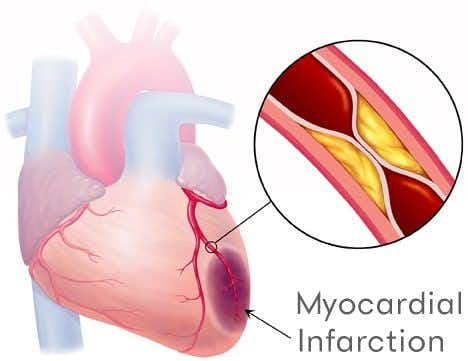This case involves a sixty-two-year-old male who died as a result of an undiagnosed myocardial infarction (MI). This man had a medical history of hypertension, hypercholesterolemia, diabetes mellitus, and obesity. Five years prior to his death, the patient was first seen by his cardiologist when he experienced chest pain while climbing stairs at work. At the time, the chest pain was relieved by nitroglycerin and rest. Further testing revealed that the man had 50% occlusion of his left anterior descending artery. The cardiologist initiated him on rosuvastatin, aspirin, clopidogrel, lisinopril, and metoprolol. The patient took all of his medications daily but did not make changes to his diet. During a check-up appointment, the man expressed that he would still occasionally have chest pain. Most concerning to him, he noticed that his left arm and jaw began to hurt earlier in the week. He explained that he administered nitroglycerin to himself but it did not relieve his symptoms. The cardiologist performed an EKG, which revealed no abnormalities. The physician told him that it was probably indigestion and recommended an over the counter medication. One week later, the man began to experience severe chest pain that radiated down his left arm while playing outside with his grandchildren. He was rushed to the emergency room where he was diagnosed with a myocardial infarction. He was in critical condition upon arrival and died due to an arrhythmia.
Question(s) For Expert Witness
1. Did the cardiologist practice the standard of care when attending to this patient’s concerns, and what could have been done to prevent death in this patient?
Expert Witness Response
The cardiologist, in this case, failed to further investigate chest pain in a patient with significant risk factors for a myocardial infarction. It was already established that the patient had a history of stable angina. He was prescribed the proper medications, however, it should have alarmed the physician when the patient experienced chest pain that was no longer relieved by nitroglycerin. At this point, the cardiologist should have ordered cardiac enzymes to see whether or not this man was experiencing a myocardial infarction. This would have warranted either cardiac catheterization or thrombolytic therapy to treat the occlusion present in his coronary artery. Treatment of a myocardial infarction is time sensitive and can be fatal if not acted upon correctly.
About the author
Jason Cohn
Jason is a 4th year medical student pursuing a career in Otolaryngology/Facial Plastic Surgery. His Interest include sports, fitness, chemistry, otolaryngology, plastic surgery, allergy/immunology, surgical oncology, human genetics, public health, preventative medicine, and rheumatology.



